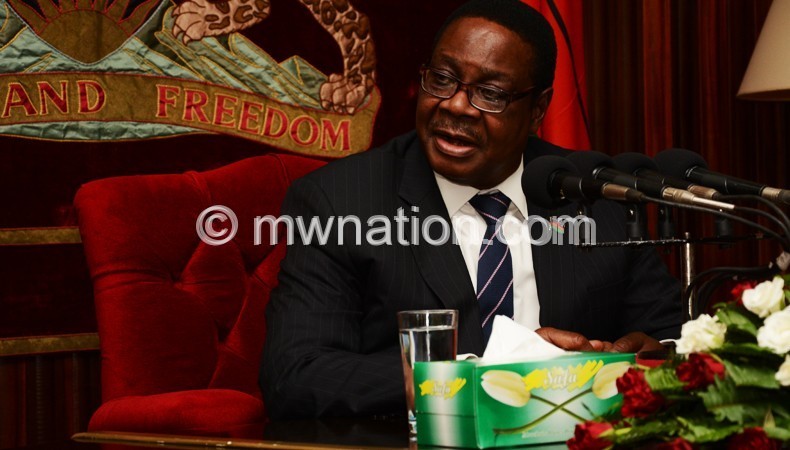APM in India water deals
President Peter Mutharika is set to wrap up side deals with the Indian government at the India-Africa Forum Summit (IAFS) that could finally finance the tapping of potable water from Mulanje Mountain and Lake Malawi, The Nation has established.
According to an official brief, Ministry of Finance, Economic Planning and Development—together with State House economic advisers—have already started the groundwork for formal submissions during the October 26-29 IAFS.

Documents The Nation has seen show that Malawi is set to get at least $23.5 million (around K13 billion) Line of Credit (LoC) for Blantyre Water Board (BWB) to pump water from Mulanje Mountain to supply the water-stressed commercial city and surrounding districts such as Chiradzulu and parts of Thyolo.
Government is also trying to secure funds for Lilongwe Water Board (LWB) to pump water from the Salima part of Lake Malawi to end water woes in the capital city, according to the brief.
However, figures for the Lake Malawi project are yet to be worked out and a Treasury source yesterday said this deal may take longer because of its potential size.
The Mutharika administration, according to the Treasury source, is also talking to the Chinese government to support Capital Hill’s ambitious lake water project.
The World Bank is also ready to invest in LWB for its Diamphwe Dam project, according to the Treasury official who asked not to be quoted giving information on delicate agreements that are still under negotiation.
In an interview yesterday, Treasury spokesperson Nations Msowoya said he needed time to get information on the developments.
But in a separate interview on Saturday, Mutharika’s chief economic adviser Collins Magalasi said the President intends to push for a quick finalisation of the water deals when he meets Indian Prime Minister Narendra Modi at the IAFS in New Delhi.
He said the President’s vision is to see the water boards also generating their own electricity for pumping water instead of solely relying on Electricity Supply Corporation of Malawi (Escom), which is not always reliable with power supply hence affecting water pumping and distribution to households and industries.
Said Magalasi: “The ambition is to make sure there is piped water throughout the year [regardless of] whether there is Escom power.”
But should the Mutharika administration pull off the Indian deals and those of other development partners, Malawians can only hope that the ongoing parastatal reforms will also help improve project management at the water boards, especially at BWB.
BWB has delayed water infrastructure projects funded by the World Bank and European Union (EU) so much that the country remains at risk of losing the financing as the donors say the funding could lapse as there has already been extensions.
The India-Africa Partnership Project—which the government of India initiated in 2008—has been one of the major trade and investment forums where Malawi and Indian businesspersons have been interacting to create business opportunities.
The forum has also been an important platform for government-to-government bilateral cooperation that has seen Malawi benefiting from Indian aid.
Based on the so-called South-South Cooperation, India has since 2008 extended LoC and grants to Malawi totalling $165.5 million (K91 billion) invested in the sectors of agriculture, technical education, energy, rural industrialisation and disaster response such as the earthquakes that hit some parts of northern Malawi.
But in terms of trade, the balance heavily favours India not just because the world’s largest democracy is a giant economy with a strong industrial base and linkages but also because Malawi has not taken advantage of the market opportunities that country has offered, including legume exports, which are in high demand there.





